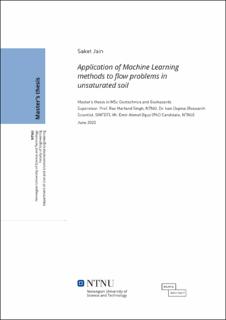| dc.contributor.advisor | Prof. Singh, Rao (NTNU) | |
| dc.contributor.advisor | Dr. Depina, Ivan (Research Scientist, SINTEF) | |
| dc.contributor.advisor | Mr. Oguz, Emir (PhD Candidate, NTNU) | |
| dc.contributor.author | Jain, Saket | |
| dc.date.accessioned | 2021-09-20T16:14:17Z | |
| dc.date.available | 2021-09-20T16:14:17Z | |
| dc.date.issued | 2020 | |
| dc.identifier | no.ntnu:inspera:57483326:35555366 | |
| dc.identifier.uri | https://hdl.handle.net/11250/2779404 | |
| dc.description.abstract | | |
| dc.description.abstract | Machine Learning (ML) is showing promising results in various fields of science and engineering. In this thesis, idea to apply machine learning to the infiltration process in the soil is explored. In order to do this, two main Machine Learning techniques are identified, Long Short-Term Memory (LSTM) and Physics Informed-Neural Networks (PINN). Both of these techniques use very different concepts to achieve the same goal. LSTM is used for sequential or timeseries data, therefore values of water content (θ), and pressure head (ψ) were calculated and arranged in space and time. PINN uses the underlying Richard’s equation to mimic infiltration. Both techniques have their own drawbacks but, in this study, PINN proved to be better than LSTM. All the modelling was done using Python 3.6 in Sypder, Anaconda. | |
| dc.language | | |
| dc.publisher | NTNU | |
| dc.title | Application of Machine Learning methods to flow problems in unsaturated soil | |
| dc.type | Master thesis | |
